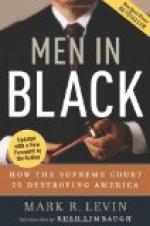These requests to charge may go back and forth indefinitely with rulings and exceptions. Either lawyer may except to a portion of the judge’s charge, thus serving notice upon him that unless he hurry up and change it he may be reversed on appeal. That is the reason why the charge of the judge has not a great effect. He has to be too careful.
In New York State the judge can not say what he thinks about the case. In other words, the charge must be indefinite. In England and the Federal courts in this country, the judge may legally express his opinion as to how the case should be decided, but that is as far as he can go. The distinction is a relic of the old days of the jury system when the judges would imprison the jury until they found as was wanted. Now the judge may only express a preference and the jury may do as they please. In some courts the democratic idea of the independence of the juryman goes to the extent of not allowing the judge to say anything specific.
The result is that the jury are confused. They are usually of so independent a nature that the judge’s charge would not greatly influence them. The clients sit by utterly confounded; they hear the judge wisely say, “I think perhaps yes, but on the whole it may be no,” and when he is through, not understanding as much as the jury, they think the judge’s charge is very fair. Having said little of import it probably is.
The continental method is so entirely different, that it is shocking. In the courts in France the judge practically says for his charge, “You’ve heard the evidence, now go on out and do what’s right.” This again illustrates the difference between the old and the new ideas of courts. The old is a battle ground where the issues are defined, the courts are kept within narrow limits and the rules of the ordeal observed strictly, and the modern, merely an investigation of a dispute with the glamor of a contest left out. It is an investigation of facts, which however bitter may be the personal animosity, should never lose sight of the main idea of arriving at the plain truth, in a common sense way.
At last the lawyers are silent, the trial is over, the judge patiently asks are there any more requests to charge, and there being no more, he turns to the jury and says, “Gentlemen, you will retire and consider your verdict.” Slowly they file out, conducted by the court attendant, to the jury-room.
XV
THE TRUE VERDICT
The truth is said. The battle is over and the mighty have prevailed. The decision is made. Justice divine and compelling is about to pronounce its sentence. The truth seeks to burst forth and the jurymen have knocked at the door of the room in which they have been locked for so many hours. The court attendant, who has been standing like a sentinel outside to prevent the approach of eavesdroppers and listeners, turns the key and sticks his head into the room, withdraws, locks the door again, and sends off for the judge.




